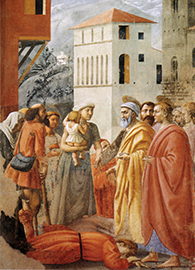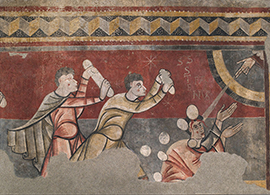Acts Week 4
Trouble in Paradise: Acts 5–7
By Jack Levison
W. J. A. Power Professor of Old Testament and Biblical Hebrew, Southern Methodist University
Read this week’s Scripture: Acts 5-7
19:04

 Enlarge
Enlarge
The community in Jerusalem takes a tumble this week en route to a powerful, spirit-filled witness. It experiences a prodigious error, a course correction, and a courageous testimony.
Making Sense of Money: The Prodigious Miscalculation of Ananias and Sapphira
So much for Jesus’ command to “turn the other cheek.” The story of Ananias and Sapphira should be called “Carry the Other Corpse.”
Here’s how this bizarre hiccup in an otherwise glowing account of the early church goes. Jesus’ followers sell their property and lay the proceeds at the feet of the apostles, who distribute the funds equitably (Acts 4:32–37). One couple, Ananias and Sapphira, holds on to a portion of the proceeds. Not a good idea. Peter sniffs out what’s going on and asks Ananias, “why has Satan filled your heart to lie to the Holy Spirit and to keep back part of the proceeds of the land? … How is it that you have contrived this deed in your heart? You did not lie to us but to God!” (5:3–4).
Speechless, Ananias keels over dead. Three hours later, Sapphira enters and also lies about the price of the land, prompting Peter to ask still another question. “How is it,” he asks, “that you have agreed together to put the Spirit of the Lord to the test? Look, the feet of those who have buried your husband are at the door, and they will carry you out.” She too keels over and is buried alongside her unfortunate husband. “And great fear seized the whole church and all who heard of these things” (5:7–11).
This is a tough text, yet in 20 years of teaching introductory classes, I’ve had only one student come to me to discuss this bothersome story: a Japanese student who was not a Christian and who opened a Bible for the first time on the first day of class. He, I think, grappled with God — at least the problem of this God, God entangled in human gaffes — more than my Christian students, many of whom have been inoculated against asking tough questions about extremely tough texts.
This is a disquieting story, but it is possible to sew a few patches of the Old Testament together to make some sense of this tragic hiatus in the harmonious growth of the early church.
Luke describes the couple’s holding back of possessions, first of all, with the Greek verb nosfizein, “hold back,” which occurs only once in the Greek Old Testament: in the story of Achan, who hoards the spoils of war (Joshua 7:21). When confronted, Achan confesses to the crime. Nevertheless, he, his family, the spoils, his animals, and his tent — everything he is, everyone he loves, everything he has — are stoned and burned in the Valley of Achor (Joshua 7:1–26).
This story of greed in wartime is not exactly like Luke’s story of greed in peacetime. Yet the verb nosfizein doubtless provides the foil against which we should understand Ananias and Sapphira’s dramatic deaths, because they, like Achan, “hold back” what belongs to the community.
The parallel suggests that the integrity of the early church community as a whole was no less rigorous than the integrity demanded by soldiers in a holy war, particularly the ruthlessly enforced prohibition against taking what belongs to the vanquished. The recurrence of the verb nosfizein and the dramatic death of the violators in both stories also underscore the authority of Peter. Like Joshua, Peter is the absolute authority who poses rhetorical questions and follows them up with pronouncements:
Joshua: “Why did you bring trouble on us? The LORD is bringing trouble on you today” (Joshua 7:25).
Peter: How is it that you have contrived this deed in your heart? You did not lie to humans but to God! (Acts 5:3–4) [Author’s Note 1]
How did they lie? With money, of course. Money, plain and simple. Salvation, remember, is not just spiritual. Last week, we saw that salvation was physical. In this very peculiar story, salvation also takes financial form.
Whatever we make of this story, it doesn’t let us capitalists (or practical capitalists — savers and investors) off the hook. I’ve been taught that personal finances are, well, personal — confidential — that charitable giving is a matter of private record only. Not so in the early church, where human need trumped the need for privacy and individual autonomy. That’s just not how it was in the first church of Christ.
Salvation, then, is physical and financial. It’s also social. Ananias and Sapphira lie to the holy spirit by violating the unity of a community. The story of Ananias and Sapphira is preceded by a beautiful description of practical communal unity:
Now the whole group of those who believed were of one heart and soul, and no one claimed private ownership of any possessions, but everything they owned was held in common. … There was not a needy person among them, for as many as owned lands or houses sold them and brought the proceeds of what was sold. They laid it at the apostles’ feet, and it was distributed to each as any had need (Acts 4:32–35).
These are the elements of successful solidarity: communal unity, evidenced by the distribution of goods, under trustworthy and equitable leadership. [Author’s Note 2]
We mustn’t let labels — socialist, communist, anti-capitalist — keep us from grasping the harmony of those early days. We mustn’t let fear of tough questions — Why did Ananias and Sapphira have to die? — keep us from facing the horror of those early days. We mustn’t let false dichotomies — spiritual versus material — keep us from embracing the wholeness of salvation in those early days.
This story transfers spirituality from the sacred to the profane. Ananias and Sapphira’s sin is not about prayer or praise or piety or Pentecostal experiences. Their sin is about money, fields and funds, earnings and charitable giving. This is where we encounter the most dire and dramatic punishment in the whole of Acts. Ultimately, we don’t know Ananias’ and Sapphira’s motivation. Pretty much all Ananias and Sapphira do is to die on command. Sapphira answers Peter’s question, but, caught off guard, she mutters merely two words in Greek: “Nai, tosoutou”: “Yes, that … price” (Acts 5:8).
So it would be foolish to try to wiggle out of the implications of this story for our own lives by comparing the purity of our motivations with the contamination of theirs. What we do know is this: lying to God, putting the spirit to the test, is about withholding money. By holding back funds, Ananias and Sapphira forfeit their place in an extraordinarily equitable community that would have given them financial security. Even if they had not paid with their lives, a little more money in their pockets would be a poor and paltry trade for a community characterized by equanimity and generosity.
Vocation, Vocation, Vocation
A less vicious but potentially more viral attack on church unity arises not long after Ananias and Sapphira are carried to their burial: a growth spurt spawns a divide between the Hebrews and the Hellenists.
Whatever has divided these two factions — perhaps a simple matter of communication, of speaking Greek or Hebrew — Greek-speaking widows from the far-flung Jewish Dispersion claimed to be slighted in the distribution of food; Hebrew-speaking widows, who were at home in their native Jerusalem, were not.
Pow! We are bonked again with the magnitude of practical matters, which the church leaders refuse to dispense with cavalierly. They do not avoid the conflict that is brewing. Instead, they wisely opt to confront it and resolve it, resulting in an amicable solution that steers clear of an early apartheid.
The already fabled leaders of the church, its apostles, understand with unwavering clarity their vocation. “It is not right,” they announce, “that we should neglect the word of God …” (Acts 6:2). They know what they are called to do, and it is not to serve food to hungry widows. Yet the apostles also recognize that material, mundane matters are essential to life together. So, along with this announcement, they make a recommendation:
[S]elect from among yourselves seven men of good standing, full of the Spirit and of wisdom, whom we may appoint to this task, while we, for our part, will devote ourselves to prayer and to serving the word” (6:3–4).
For all of its practicality, this is a startling recommendation, because the character of the people they select seems disproportionate to the task at hand; they are people of integrity, full of the Spirit, and wise. Stephen, one of them, is described as “full of faith and the Holy Spirit” (Acts 6:5). This is a stupendous, gifted group of men, whose calling is, evidently, to wait on tables in the daily distribution of food to widows.
Why these men need to possess integrity, inspiration, faith, and wisdom is not clear — until we realize that the words “waiting on tables” could also mean tabulating tables or, as one SPU student put it, making spreadsheets. Tables could mean physical tables, at which the widows would eat, or financial tables, in which the daily distribution was recorded.
In short, the men chosen are bean counters — inspired, wise, and honest bean counters who can keep the tables orderly and honestly — but bean counters nonetheless.
We have a lot to learn about vocation from this little story, tucked away in the annals of the early church. We learn the need for clarity of vocation, whether one is a visionary and public figure or a bean counter. We learn the need for inspiration, for wisdom, for integrity, whether one is a visionary or a bean counter. And we learn the need for different vocations to keep the church vital and just — both visionaries and bean counters. If salvation is material, then everyone must have a holy spirit to manage mundane matters with integrity.

 Enlarge
Enlarge
Bean Counter Turned Holy Terror
In last week’s Lectio, we glimpsed Luke’s literary pattern. He summarizes signs and wonders (Acts 2:43), then gives the example of a sign: the healing of the lame man (3:1–10). He does this again when he describes signs and wonders done through the apostles, including the strange power of Peter’s shadow (5:12–16), followed by a specific example: an angel rescues the apostles from prison (actually, in a quite ordinary way — by simply opening the prison doors and leading them out) (5:19–20).
The next day, the temple leaders tell them to shut up, but the apostles respond by snubbing authority altogether and saying, “We must obey God rather than any human authority” (5:29). This is the New Testament credo that counterbalances Romans 13:1: “Let every person be subject to the governing authorities.” The protest in Acts — to serve God, not humans — that’s inspired boldness! That’s guts. That’s what we need.
This miracle, that daring, develops later still, when one of the bean counters turns into a holy terror. The first one appointed to serve tables is Stephen, “a man full of faith and the Holy Spirit” (Acts 6:5). Though not an apostle, Stephen quickly takes on the role of an apostle: “Stephen, full of grace and power, did great wonders and signs among the people” (6:8). Like the apostles, he has the power — a shorthand reference to the holy spirit, as in Luke 24:49 and Acts 1:7–8 — to be able to perform signs and wonders and, like Peter, to deliver an inspired interpretation of Scripture that rouses his opponents to frenetic hatred.
Stephen’s opponents set up false witnesses, who accuse him: “This man never stops saying things against this holy place and the law” (Acts 6:13). They are, for the most part, right. Stephen delves deep into the Old Testament to convince other Jews that the promised land is not of primary importance, that Abraham did not even get “a foot’s length” in the land (7:5), that salvation during famine came from faraway Egypt in the days of Joseph (7:9–16).
He then drives home with a vengeance the point that their hero, Moses, was rejected time and again by his own people, the Israelites; he became a refugee, not in the promised land, but in Midian, across the Jordan River to its east.
Then the nail in the coffin (his own, too): a tent to house God’s presence was constructed in the wilderness and only then brought to the promised land. The building that replaced that tent, the temple, Solomon its builder recognized, isn’t really God’s throne. Heaven is, so no house can suffice. This is straight from Isaiah 66:1–2:
Thus says the LORD: Heaven is my throne and the earth is my footstool; what is the house that you would build for me, and what is my resting place? All these things my hand has made, and so all these things are mine, says the LORD. But this is the one to whom I will look, to the humble and contrite in spirit, who trembles at my word.
We argue and argue and argue over the meaning of the Bible — especially when it comes to polarizing issues such as homosexuality, women’s rights, and the death penalty. This persistent arguing is a disease, a propensity we Christians inherit, like sickle-cell anemia or high cholesterol. Stephen and his opponents show us the dark side of disagreement.
Stephen is right: the land and temple are subsidiary realities. But his opponents are right, too: the temple and land are places of God’s presence. The Bible supports both points of view, depending on which passages you choose to favor. Those with power, with authority, with ample funding, of course, win the battle. Furious, they grind their teeth, cover their ears, rush together, and stone Stephen to death (Acts 7:54–60).
Yet Stephen wins, too, for he has gazed into heaven and seen a spectacular vision of Jesus. Before his own death, Jesus predicted, “[F]rom now on the Son of Man will be seated at the right hand of the power of God” (Luke 22:69). This is what Stephen is privileged to see: “Look, … I see the heavens opened and the Son of Man standing at the right hand of God!” (Acts 7:56).
That’s nothing, however, compared with what he prays with his last gasp: “Lord, do not hold this sin against them” (Acts 7:60). Stephen has absorbed the essence of Jesus’ teaching. He has learned well. He has lived well. Now he dies well.
Questions for Further Reflection
- The story of Ananias and Sapphira is a troubling one amid the annals of the early church. What is at the heart of their sin, and why do you think it results in such dramatic consequences? What does Dr. Levison say we learn about salvation as a result of their story? What impact might that have on your day to day experience of discipleship?
- Acts 6:1–7 describes a very practical need in the early church. In what ways have your communities of faith balanced the “ministry of the word” with the “waiting of tables?” If one or the other is being neglected, how might you work to effect change.
- Rather than setting up a chasm between those who are “called to ministry” and those who are not, Dr. Levison sees in Acts 6:1–7 the importance of wisdom, integrity, and giftedness in all vocations and walks of life. Think about your own sense of call or vocation. How might God be able to use your work for Kingdom good, regardless of the setting?
- In discussing the martyring of Stephen, Dr. Levison calls out the church’s propensity to arguments and conflict. What are the positive and negative impacts of disagreement? How are these demonstrated in Stephen’s story?
<<Previous Lectio Back to Acts Next Lectio>>

This work is licensed under a Creative Commons License.




